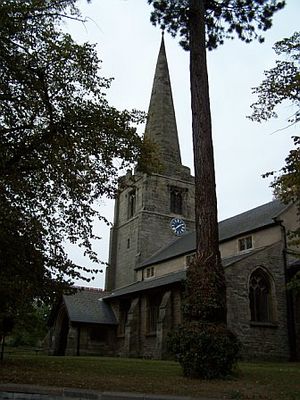All Saints' Church, Cotgrave facts for kids
Quick facts for kids All Saints’ Church, Cotgrave |
|
|---|---|

All Saints’ Church, Cotgrave
|
|
| 52°54′42″N 1°02′37″W / 52.9117°N 1.0436°W | |
| OS grid reference | SK 64412 35344 |
| Location | Cotgrave |
| Country | England |
| Denomination | Church of England |
| Architecture | |
| Heritage designation | Grade I listed |
| Administration | |
| Parish | Cotgrave |
| Deanery | East Bingham |
| Archdeaconry | Nottingham |
| Diocese | Diocese of Southwell and Nottingham |
All Saints’ Church is a beautiful old church located in Cotgrave, England. It is part of the Church of England and is a very important building. It has a special status called Grade I listed, which means it's one of the most important historic buildings in the country.
Contents
Discovering All Saints’ Church History
This church has been around for a very long time, since the 12th century! That's over 800 years ago. It has seen many changes over the centuries.
Restoration and Rebuilding Efforts
The church was carefully repaired and updated between 1877 and 1878. This work was done by architects named Evans and Jolley. Sadly, in 1996, the church was badly damaged by a fire. But don't worry, it was lovingly restored again and looks wonderful today.
A Safe Place During the Plague
Did you know that in 1637, during a terrible outbreak of the plague (a very serious illness), the church was used as a safe place? People used it to store food for the village. To keep everyone safe, money for goods was disinfected. It was passed through a special hollowed-out stone filled with vinegar. This stone is still in the church today, a cool reminder of its past!
The Church Bells: A Musical Tradition
All Saints’ Church has a set of eight bells that can be rung. Most of these bells were made by a famous company called John Taylor & Co. If you visit, you might hear the bell ringers practicing. They practice regularly on Fridays and Sundays, making beautiful music for the village.
The Grand Clock of All Saints’ Church
The church has a very impressive clock in its tower.
How the Clock Was Built
A brand new clock was put in place in 1865 by a clockmaker named Reuben Bosworth. This clock was designed to run for eight days on a single winding. Its inner workings were huge! They were enclosed in a cast-iron frame that was about 1.5 meters long, 0.9 meters wide, and 1.4 meters high. The gears were made of brass, and the largest ones were 36 centimeters across. The pendulum was very long, about 3.2 meters, and the weights were very heavy, weighing about 250 kilograms each!
The clock also had a "quarterjack," which means it chimed every 15 minutes. It had one large clock face, about 1.5 meters wide. The chimes and strikes used the bells already in the tower. The whole clock cost £135, which was a lot of money back then, and people in the village helped pay for it.
Modern Updates to the Clock
The clock was repaired and updated in 1977 by John Smith and Sons of Derby. At that time, they added electric motors to help with the chimes and strikes, and to automatically wind the clock. In 2006, the clock was restored again. The clock face was repainted and gilded (decorated with gold) in 2007, making it shine brightly.
More to Explore
- Grade I listed buildings in Nottinghamshire
- Listed buildings in Cotgrave

